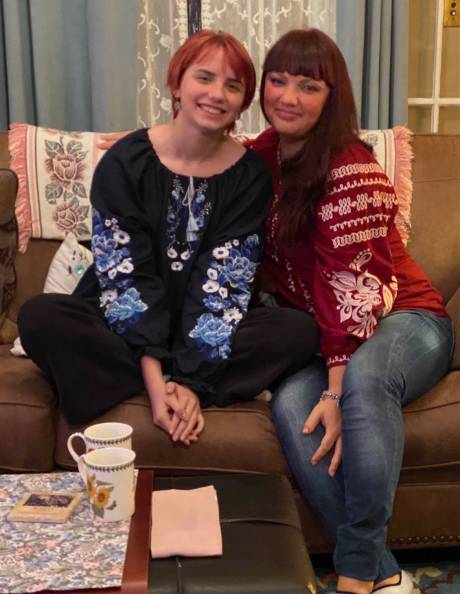
As Alina Kovalenko and her daughter Vlada settled onto a comfy-looking couch bathed in soft blush lighting from a nearby lamp, it was hard to imagine the terror and destruction that surrounded them not long ago.
Alina had been teaching English at a university, and her teenage daughter was finishing high school with a goal to study languages — English, French and Dutch — in college. Their lives were flowing along as Russia placed troops in Belarus, and by February, fighting began in eastern Ukraine.
Amidst the shock of Russia’s infiltration and gradual obliteration within sections of Ukraine territory, Alina still didn’t quite believe that it would reach her beloved hometown of Kharkiv. It was her 17-year-old daughter who kept up-to-date with friends and began to give mom nudges that they should move.
After weeks of disbelief that military maneuvers and bombings were heading their way, the pair eventually — and reluctantly — left their homeland in search of peaceful existence. They went to Poland but realized that, since Poland had assisted Ukraine, it was not a safe country either.
Meanwhile, Art and Carla Wahls were sitting in their Batavia home’s living room in April watching television.
“We saw things on TV about the war. And then one night there was a piece on that President Biden was saying that he was going to allow at least 100,000 Ukrainians come to the United States through the United for Ukraine program,” Carla said during an interview with The Batavian. “So we're watching that, and Art turned to me, and he said, ‘we need to do something. We need to help.’ And we started the search process to find the perfect family.”
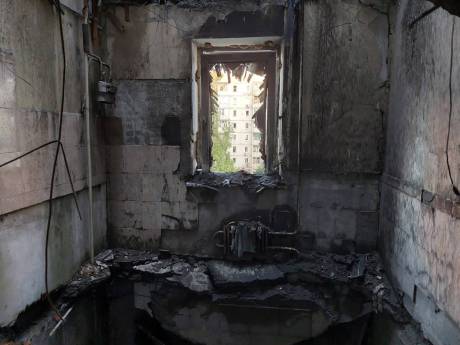
Alina’s disbelief was further validated by her parents, who felt that it was going to be ok for them to stay, even though her brother encouraged Alina to keep her car full of “petrol” and have a backpack filled with necessities at the ready. The sounds of bombs grew ever closer, and Ukraine residents’ lives changed into that of a fugitive — sleeping in their clothes, having the backpack nearby, and ready to run at a moment’s notice.
Of course, unlike a criminal fugitive, Alina, Vlada and their family and friends had done nothing wrong. Vlada kept asking her mom if they could move far from the violence, and there came a point when the worried mom conceded.
They had a curfew not to be outside from 4 p.m. to 6 a.m. each day, and shopping lines were very long due to the short amounts of time they had to get somewhere and back before 4. Roads were dangerous, with officials checking for valid passports and Russian soldiers shelling the town.
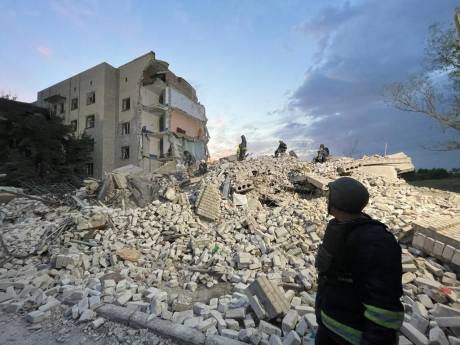
“It was first a shock to see shelled cars in Kharkiv,” Alina said. “It was surrounded by Russians. I didn’t want to believe it would be as bad as it was.”
They moved to Poland, but Russian troops were getting ever closer to the country, so — with Vlada’s prompting — Alina decided it was time to seek safety farther away.
“Children shouldn’t see this all. Vlada was afraid all the time,” Alina said. “I told her ‘if you wish, you can try.’”
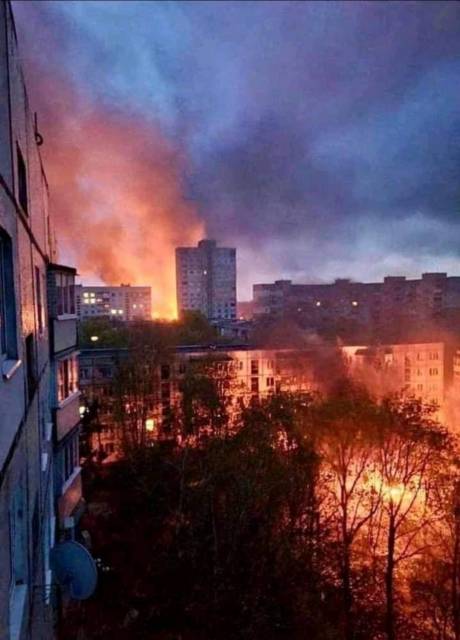
So Vlada researched online, and Carla was also doing her research, and they eventually got connected through Icanhelp.com. After registering, the Wahls received “a plethora of people looking for help,” Carla said, but many of them had the money and means to move. They were just looking for a United States citizen to host them. So she sifted through applicants as Vlada looked at profiles, and they eventually met via Zoom.
“So we were afraid that if the worst comes to the western part of Ukraine, they could easily (cross the border) and come to Poland. My brother, he’s a military soldier, they're in Kharkiv and our family friend, Stas, he's also there and he protects all this, but I also didn't believe that there are some people who can give you housing, who can give you financial support and mental support and any kind of support,” Alina said. “After the first (Zoom) video, I say no. It’s a huge responsibility that people have to take.”
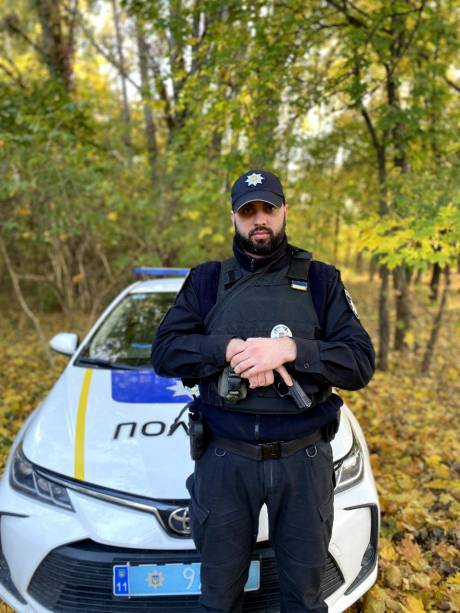
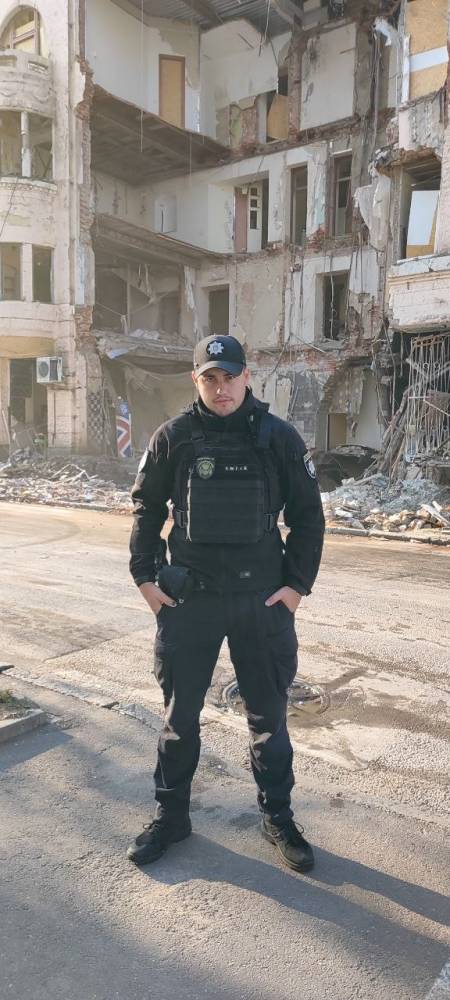
But as they talked, some patterns arose. Alina is close in age to the Wahls' daughter Andrea. Arthur was Alina’s brother’s name and that of Carla’s husband. Both Art Wahl and Alina’s dad were mechanics. These little details slowly forged a trust between them that this relationship was meant to be.
The women’s English was fairly good, and Carla has been giving them further help. Vlada is studying at the university online — beginning at 1 a.m. to coordinate with Ukraine time — and taking dance, playing acoustic guitar and writing songs about the war.
“You can’t understand what she’s saying, but you understand the feeling,” Carla said.
Vlada displayed an obvious spark of enthusiasm for acting, singing, playing piano and guitar and dancing.
“My soul is music,” she said, sharing one possible goal. “Maybe working in the theater.”
It has taken a while for them to get used to noises — such as a loud thunderstorm — and realize they are no longer in danger.
“For us, it’s important to be in a safe place and not have to run away from bombing,” Alina said. “Each of us had a life that we could control. We had a job, money, a home. Vlada was going to have her first concert, but war (stopped that from happening). We planned to buy a dress for her prom … I said ‘tomorrow we will go,’ and we never did.”
Memories of their journey are still vivid, as the women spoke of sleeping in shifts with family members and being cognizant of where they would go if they had to move quickly. Basements were considered safety zones.

As Alina grappled with explaining the terror they felt -- with crumbled buildings, fires, death -- she credited her daughter for doing much of the legwork for their final escape to a U.S. family.
“She was searching for them. She was texting everybody. So she did all the job. And then she just said, ‘Mom, I found the family. We need to make a chat. Okay, okay, I'm ready. Let's chat,” Alina said. “So in Poland, we leave like with people who also gave us housing, food and that's all, and I understood that I just couldn't go anywhere because we couldn't even buy tickets. So that's why we decided to go farther because we were afraid to be in the same situation like we were in Kharkiv.”

Since being in Batavia for nearly two months, they are experiencing a better life, a safer existence. There have been walks through a park, a trip to Niagara Falls, afternoon tea (from Carla’s English heritage), discovering buttery Eggo waffles with syrup “a dream come true,” Vlada said with a grin — and the recognition of Ukraine flags hanging at random homes and office buildings.
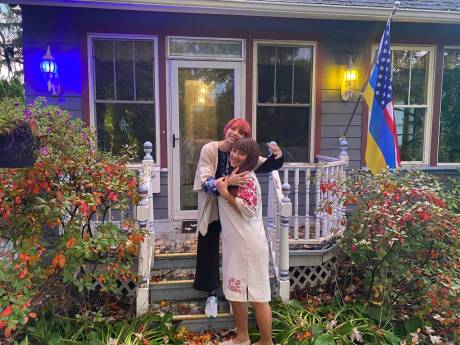
“It’s so nice when in a different country and to see the Ukraine flag; it’s in our DNA,” Alina said, explaining the Coat of Arms blouses that she and Vlada quickly changed into for a photo. “This became our national protest. We are Ukraine, we belong to Ukraine. Everybody wears it to show that Kharkiv is Ukraine.”
When Art first suggested that they help a Ukraine family, his reason was simple, he said.
“They’re people like us,” he said. “What if that happened in the U.S.?”
They have each discovered how true that is — despite different cultural backgrounds, Alina and Vlada have been embraced by their hosts and become part of the Wahls brood.
“They’re already in our hearts. Our children (Andrea and Jamie) love you, and our grandchildren love you,” Carla said. “You’re family.”
If anyone is interested in serving as a host family and would like some guidance, email Carla.
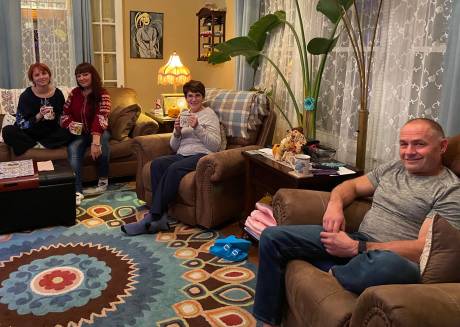
Top photo of Alina and her daughter Vlada Kovalenko, who came from Kharkiv, Ukraine to stay with host family Art and Carla Wahls of Batavia, having afternoon tea with Carla and posing in front of the Wahls' U.S. and Ukraine flag, and relaxing in their living room together, above. Photos by Joanne Beck. Photos of the destruction in Ukraine and of Alina's brother, Arthur, and good friend Stas, submitted by Alina Kovalenko.
